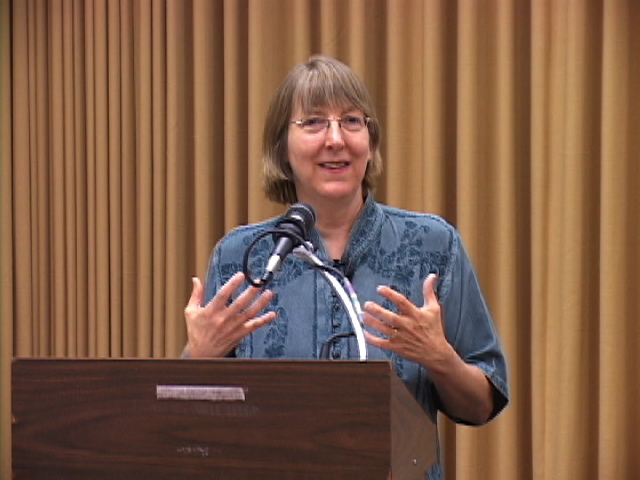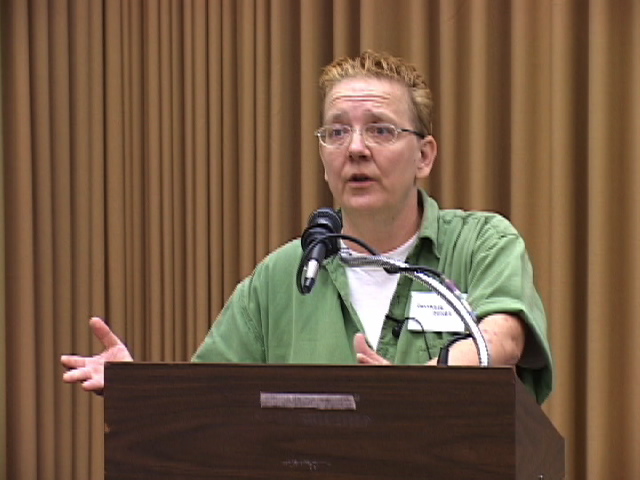UPC’s Forum on Promoting Veganism Widely and Effectively (Part I)
On August 16-17, UPC held its 4th Annual Forum at the University of Colorado, Boulder campus. Following are summaries of talks by The Sexual Politics of Meat author Carol Adams (cja@caroljadams.com), Jack Norris of Vegan Outreach (veganoutreach.org), and Pattrice Jones of the Eastern Shore Sanctuary & Education Center (bravebirds.org). Other talks will appear in future issues (Part II & Part III). We thank vegan chef Lynn Halpern for her fabulous luncheons, and Annie & Neil Hornish for filming the Forum.
“Beyond Just ‘Living With’ Meat Eaters”
by Carol J. Adams

Photo By:Annie & Neil Hornish
Meateaters are "blocked vegetarians." Something in their life is more important to them than acting ethically. To avoid the issues they'll often try to get you to argue with them, so they can "win," as in "You eat plants, don't you? What about plants' feelings?" It isn't that they care about plants; rather, they want to set you up as a target. Don't be a target. Step aside. Develop one-liners like "How many green peppers do you have at home as companions?" Hand them a brochure and say, "Why don't your read this first, and then let's talk."
Meateaters think they've "won" if they see you have a plate of "scarcity" at a restaurant while they have a plate of "abundance." If you're dining with meateaters at a place that doesn't have a vegan menu, order ahead of time, so they'll see you have this wonderful food. Never act "deprived." Even if it's just iceberg lettuce, praise it for being fresh and delicious. If they say, "Don't you miss hamburgers?" say, "I don't miss hamburgers and I don't miss heart attacks."
Instead of shutting meateaters out, invite them in. Bring vegan food to the office for your lunch, to office parties and other social occasions. Invite others to try it. Bring an extra sandwich to share. If you have an event with, say, peace activists or environmentalists who fear distancing themselves even further from the mainstream by adding veganism to their agenda, serve a vegan meal without making an issue of it. Just make sure there is lots of delicious food. Share this wonderful way of living.
“Mainstreaming Veganism by Reaching Youth and Focusing on Animal Suffering”
by Jack Norris

Photo By:Annie & Neil Hornish
When people ask about health, I like to bring up the ammonia issue: the animals they consume lived in a virtual outhouse before death. This doesn't appear in videos.
Some say we should focus on health and not show graphic images of animal suffering, or leaflet the public. Yet before the 1970s, the vegetarian movement stressed health, had no graphic pictures, and didn't leaflet, yet people did not go vegetarian to the extent that today coincides with the increased use of graphic images of animal suffering. People who become vegetarian for strictly health reasons often go back to meateating whereas people who become vegetarian for ethical reasons seem to stick with it. Even the American Cancer Society has had little success with the health message, and meateating in Britain is back to pre-Mad Cow levels. Health is not a strong motivator.
College students are the most receptive to the ethical argument. We need an organized outreach to college students. This is what Vegan Outreach does with our "Why Vegan?" brochure. A great way to reach a million students each year is to Adopt a College. The number of new vegetarians increases exponentially when you change one person. Leafleting reaches more people than tabling. There are people who didn't know they would care until they read your leaflet, so don't wait. Put a leaflet in their hands. If one person in 100 who take your leaflet goes vegan, your time is well spent.
If we are hush hush about what animals go through, people will never get the ethics message. Veganism should be about animal suffering, not just about ourselves.
“Get Real: Facing Reality and Crafting Strategies Accordingly”
by Pattrice Jones

Photo By:Annie & Neil Hornish
Despite activism, meat consumption has risen steadily since the 1950s. Each person is eating more meat now than in the 1950s. Chicken consumption has more than tripled since the 1950s, and fish is way up, too.
Meat production locations are shifting to developing countries, to avoid labor and environmental restraints. We are raising costs, so industry goes elsewhere, yet we want to end animal exploitation, not just change its location. Lest we get disheartened, remember we reduced veal consumption not on the basis of health and environment, but ethics. This shows that a straight abolition message works: "Look at how these animals are treated. This means you can't eat them."
We need to go global more than we have, to diversify and not just stay white middle class. This class is no longer the majority in the US. And we should not assume that poor and other non-mainstream people have too much else to worry about to care about animals and ethics. Poor people make ethical decisions every day. Here are groups vegan activists can reach out to as potential allies:
- Anti-globalization activists: they are already boy-cotting products for ethical reasons.
- Feminists.
- Radical disability activists: they already distrust the medical establishment, so we can position veganism as a health issue as well as an ethical one.
- Anticolonial & anti-dietary racism activists: they oppose using poor countries and people as dumping grounds for toxic waste and bad/ surplus "food," like forcing dairy milk on school children, many of whom are lactose intolerant and feel sick after drinking it, making it hard for them to concentrate.
- Peace activists.
Remember that vegan means respect for all animals, including humans! When asking others to change and make time for the animals, show courtesy and respect to our human friends.